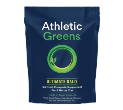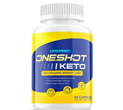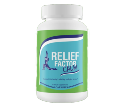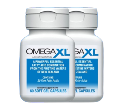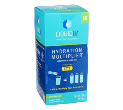The Best PCOS Supplements You Can Buy
Edited and medically reviewed by ✔️ Team of BestInSupplements | Written by Katelyn Johnson (B.S. and M.S. in Nutrition Science)
Find out the best natural remedies for PCOS symptoms, including the best PCOS supplements to take. This article contains a detailed list of the best PCOS supplements on the market today.

PCOS, or polycystic ovary syndrome, is a hormonal endocrine disorder that impacts women of reproductive age. It is one of the most common female hormone disorders, affecting between 5-15% of women 1.
It's not always easy to diagnose, even though it's common. In fact, one-third of PCOS patients worldwide say they waited at least two years for a diagnosis 2.
Maybe you will find interesting this list: The Best Pre-Workout Supplements for Women You Can Buy
Some of the most common symptoms of PCOS include:
- Infrequent or absent periods, as well as other menstrual irregularities.
- Acne, consistent breakouts, and blemishes.
- Abnormal hair growth on the face/body.
- Hair thinning or loss on the scalp.
- Cysts on the ovaries.
- Abdominal fat accumulation.
- Infertility symptoms, including ovulation failure and miscarriage.
PCOS is a serious condition that indicates an imbalance in the body's metabolic and hormonal systems.
Obesity affects approximately 80% of PCOS patients 3. If untreated, individuals can suffer from Type 2 diabetes, heart disease, stroke, depression, anxiety, and endometrial cancer are all more common in PCOS patients 4.
The good news is, that PCOS is a very treatable condition. In addition to dietary and lifestyle modifications, natural supplements for PCOS can be an important part of your overall treatment plan.
Best PCOS Supplements You Will Find In The Market
Natural PCOS supplements can make a significant impact on helping with weight loss, acne, irregular cycles, anxiety, hair loss/growth, and more 5. Based on scientific findings, there are best dietary supplements that can aid in the treatment and full recovery of PCOS:
- Probiotics.
- Herbal Blends (hormone balance).
- Resveratrol.
- Inositol.
- Fish oil.
- Mineral supplements.
- Spearmint tea.
They do so by restoring fertility and hormone balance, regulating menstrual cycles, improving skin and hair, and lowering the risk of developing other chronic illnesses.
Best Probiotic Supplement for PCOS: Dr. Brighten's Spore Biotic
Dr. Brighten Spore Biotic is a probiotic supplement that improves gut health and reduces inflammation.
Your gut is in charge of absorbing nutrients from food, which then aids in the production of hormones your body requires, and the breakdown and elimination of hormones it does not, which is why there is such a link between the two!
Probiotics are beneficial for PCOS because they restore gut ecosystem balance and recolonize your gut with beneficial bacteria. This aids in interrupting the leaky gut/inflammatory cycle at the source.
We've reviewed an alternative for probiotics: Klaire Labs Probiotic Reviews, Ingredients, Does It Work?
Probiotics have been shown to improve hormonal balance and reduce inflammation in PCOS patients in studies. Probiotic supplements improved hormonal and inflammatory markers for women with PCOS, according to a large systematic review and meta-analysis published in 2020 6.
Best Herbal Blend Supplement for PCOS: Progest-Harmony
Progest-Harmony is a powerful, naturally-derived formula that helps to maintain a healthy progesterone-to-estrogen hormone ratio and boosts prolactin levels. A combination supplement like Progest-Harmony - which contains chasteberry, white peony, and licorice - combines the best-studied herbal remedies to support PCOS hormonal imbalances.
PCOS, as well as other female hormonal imbalances involving progesterone and estrogen, have been studied and found to be effective with a variety of herbs. Chasteberry (also known as chaste tree or vitex) and black cohosh showed the strongest evidence for helping to manage infrequent or absent periods in PCOS in a 2014 systematic review of eight clinical trials 7. Both of these herbs have also been shown to help with a variety of hormonal imbalances in women 8.
In women with PCOS, chasteberry has been shown to help with infertility, lower testosterone levels, and improve obesity and insulin levels 9.
Best Resveratrol Supplement for PCOS
Resveratrol is a plant compound found in the seeds and skins of grapes and berries that acts as an antioxidant. Resveratrol appears to be effective for women with PCOS in clinical trials, and it can:
- Reduce the amount of inflammatory markers in your body (800 mg per day) 10.
- Improve hormone balance (800 mg per day) 11.
- Significantly lower testosterone, DHEA, and fasting insulin levels, while improving insulin resistance 12.
Best Inositol Supplement for PCOS: Jarrow Formulas Inositol Powder
Jarrow Formulas Inositol Powder contains inositol, which is an intracellular messenger for insulin. It improves insulin sensitivity, reduces androgens, and supports regular ovulation. Inositol is a vitamin-like sugar that is also known as vitamin B8. In women with PCOS, myo-inositol has been studied extensively and has been shown to be the most effective on metabolism 13.
Myo-inositol was found to be as equally effective as the standard drug metformin at improving fasting insulin, insulin resistance, and testosterone in a 2019 systematic review and meta-analysis 14. Because metformin has potential side effects, researchers believe that myo-inositol is a better option for improving PCOS hormonal and metabolic profiles.
Best Fish Oil Supplement for PCOS: OmegaWell by Live Conscious
Fish oil is high in vitamin D and omega-3 fatty acids, both of which may be beneficial to PCOS sufferers.
Vitamin D is a steroid hormone that controls the expression of over 200 genes in our bodies. This vitamin improves insulin sensitivity and promotes follicle maturation. In studies, Vitamin D has been shown to lower fasting blood sugar, insulin resistance, and testosterone in women with PCOS and vitamin D deficiency 15,16.
Discover this popular fish oil supplement: Omega XL Reviews, Ingredients, Does It Work?
Omega-3 fatty acids aid in lowering inflammation and testosterone levels, while also regulating the menstrual cycle in women affected by PCOS 17. Omega 3 supplements have been shown in a number of studies to improve inflammatory and antioxidant markers, insulin resistance, total cholesterol, and testosterone in women with PCOS 18.
Best Magnesium Supplement for PCOS: Magnesium Glycinate by Pure Encapsulations
Pure Encapsulations' Magnesium Glycinate is beneficial for PCOS because it relaxes and calms the nervous system, promotes sleep, regulates the HPA axis (stress), optimizes insulin and thyroid function, is anti-inflammatory, and promotes estrogen metabolism.
When compared to a placebo group, one randomized, placebo-controlled trial of PCOS patients supplementing with magnesium oxide and zinc for 12 weeks found significant reductions in markers of inflammation and oxidative stress 19.
Best MACA Supplement for PCOS: Organic Maca Powder
MACA is an adaptogenic herb that supports the adrenal glands, enhances the immune response, and reduces stress. Maca root can help women with PCOS because it reduces estrogen, minimizes facial hair growth, regulates menstrual cycles, and increases fertility 20. Maca also aids in the proper functioning of the hypothalamus, pituitary, and thus the endocrine glands as a whole.
References
- Fazleen, N. E., Whittaker, M., & Mamun, A. (2018). Risk of metabolic syndrome in adolescents with polycystic ovarian syndrome: A systematic review and meta-analysis. Diabetes & Metabolic Syndrome: clinical research & reviews, 12(6), 1083-1090.
- Tay, C. T., Moran, L. J., Wijeyaratne, C. N., Redman, L. M., Norman, R. J., Teede, H. J., & Joham, A. E. (2018). Integrated Model of Care for Polycystic Ovary Syndrome. Seminars in reproductive medicine, 36(1), 86–94. https://doi.org/10.1055/s-0038-1667310
- Toosy, S., Sodi, R., & Pappachan, J. M. (2018). Lean polycystic ovary syndrome (PCOS): an evidence-based practical approach. Journal of Diabetes & Metabolic Disorders, 17(2), 277-285.
- Parker, M., Warren, A., Nair, S., & Barnard, M. (2020). Adherence to treatment for polycystic ovarian syndrome: A systematic review. PloS one, 15(2), e0228586.
- Abasian, Z., Rostamzadeh, A., Mohammadi, M., Hosseini, M., & Rafieian-Kopaei, M. (2018). A review on role of medicinal plants in polycystic ovarian syndrome: pathophysiology, neuroendocrine signaling, therapeutic status and future prospects. Middle East Fertility Society Journal, 23(4), 255-262.
- Shamasbi, S. G., Ghanbari-Homayi, S., & Mirghafourvand, M. (2020). The effect of probiotics, prebiotics, and synbiotics on hormonal and inflammatory indices in women with polycystic ovary syndrome: a systematic review and meta-analysis. European journal of nutrition, 59(2), 433–450. https://doi.org/10.1007/s00394-019-02033-1
- Arentz, S., Abbott, J. A., Smith, C. A., & Bensoussan, A. (2014). Herbal medicine for the management of polycystic ovary syndrome (PCOS) and associated oligo/amenorrhoea and hyperandrogenism; a review of the laboratory evidence for effects with corroborative clinical findings. BMC complementary and alternative medicine, 14(1), 1-19.
- Rafieian-Kopaei, M., & Movahedi, M. (2017). Systematic review of premenstrual, postmenstrual and infertility disorders of Vitex agnus castus. Electronic physician, 9(1), 3685.
- Jazani, A. M., Azgomi, H. N. D., Azgomi, A. N. D., & Azgomi, R. N. D. (2019). A comprehensive review of clinical studies with herbal medicine on polycystic ovary syndrome (PCOS). DARU Journal of Pharmaceutical Sciences, 27(2), 863-877.
- Brenjian, S., Moini, A., Yamini, N., Kashani, L., Faridmojtahedi, M., Bahramrezaie, M., Khodarahmian, M., & Amidi, F. (2020). Resveratrol treatment in patients with polycystic ovary syndrome decreased pro-inflammatory and endoplasmic reticulum stress markers. American journal of reproductive immunology (New York, N.Y. : 1989), 83(1), e13186. https://doi.org/10.1111/aji.13186
- Bahramrezaie, M., Amidi, F., Aleyasin, A., Saremi, A., Aghahoseini, M., Brenjian, S., ... & Pooladi, A. (2019). Effects of resveratrol on VEGF & HIF1 genes expression in granulosa cells in the angiogenesis pathway and laboratory parameters of polycystic ovary syndrome: a triple-blind randomized clinical trial. Journal of assisted reproduction and genetics, 36(8), 1701-1712.
- Banaszewska, B., Wrotyńska-Barczyńska, J., Spaczynski, R. Z., Pawelczyk, L., & Duleba, A. J. (2016). Effects of Resveratrol on Polycystic Ovary Syndrome: A Double-blind, Randomized, Placebo-controlled Trial. The Journal of clinical endocrinology and metabolism, 101(11), 4322–4328. https://doi.org/10.1210/jc.2016-1858
- Pizzo, A., Laganà, A. S., & Barbaro, L. (2014). Comparison between effects of myo-inositol and D-chiro-inositol on ovarian function and metabolic factors in women with PCOS. Gynecological endocrinology : the official journal of the International Society of Gynecological Endocrinology, 30(3), 205–208. https://doi.org/10.3109/09513590.2013.860120
- Facchinetti, F., Orrù, B., Grandi, G., & Unfer, V. (2019). Short-term effects of metformin and myo-inositol in women with polycystic ovarian syndrome (PCOS): a meta-analysis of randomized clinical trials. Gynecological endocrinology : the official journal of the International Society of Gynecological Endocrinology, 35(3), 198–206. https://doi.org/10.1080/09513590.2018.1540578
- Seyyed Abootorabi, M., Ayremlou, P., Behroozi-Lak, T., & Nourisaeidlou, S. (2018). The effect of vitamin D supplementation on insulin resistance, visceral fat and adiponectin in vitamin D deficient women with polycystic ovary syndrome: a randomized placebo-controlled trial. Gynecological endocrinology : the official journal of the International Society of Gynecological Endocrinology, 34(6), 489–494. https://doi.org/10.1080/09513590.2017.1418311
- Razavi, M., Jamilian, M., Karamali, M., Bahmani, F., Aghadavod, E., & Asemi, Z. (2016). The Effects of Vitamin D-K-Calcium Co-Supplementation on Endocrine, Inflammation, and Oxidative Stress Biomarkers in Vitamin D-Deficient Women with Polycystic Ovary Syndrome: A Randomized, Double-Blind, Placebo-Controlled Trial. Hormone and metabolic research = Hormon- und Stoffwechselforschung = Hormones et metabolisme, 48(7), 446–451. https://doi.org/10.1055/s-0042-104060
- Yang, K., Zeng, L., Bao, T., & Ge, J. (2018). Effectiveness of Omega-3 fatty acid for polycystic ovary syndrome: a systematic review and meta-analysis. Reproductive biology and endocrinology : RB&E, 16(1), 27. https://doi.org/10.1186/s12958-018-0346-x
- Sadeghi, F., Alavi-Naeini, A., Mardanian, F., Ghazvini, M. R., & Mahaki, B. (2020). Omega-3 and vitamin E co-supplementation can improve antioxidant markers in obese/overweight women with polycystic ovary syndrome. International journal for vitamin and nutrition research. Internationale Zeitschrift fur Vitamin- und Ernahrungsforschung. Journal international de vitaminologie et de nutrition, 90(5-6), 477–483. https://doi.org/10.1024/0300-9831/a000588
- Afshar Ebrahimi, F., Foroozanfard, F., Aghadavod, E., Bahmani, F., & Asemi, Z. (2018). The Effects of Magnesium and Zinc Co-Supplementation on Biomarkers of Inflammation and Oxidative Stress, and Gene Expression Related to Inflammation in Polycystic Ovary Syndrome: a Randomized Controlled Clinical Trial. Biological trace element research, 184(2), 300–307. https://doi.org/10.1007/s12011-017-1198-5
- Rao, S. K. (2021). An Insight on Polycystic Ovary Syndrome (PCOS) and Use of Herbal Medicines as Alternative Treatment. In Treating Endocrine and Metabolic Disorders With Herbal Medicines (pp. 125-163). IGI Global.
Every editorial product is independently selected, though we may be compensated or receive an affiliate commission if you buy something through our links.
Recently Purchased


